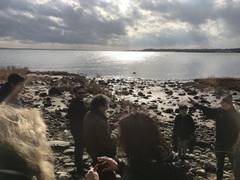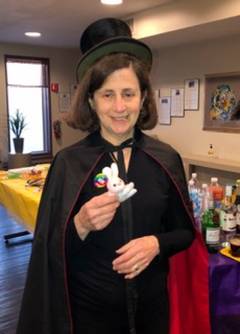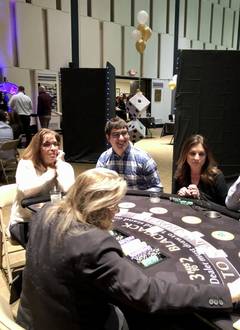Balak 5779: Blessings and Curses
07/23/2019 04:07:58 PM
Jul23
| Author | |
| Date Added | |
| Automatically create summary | |
| Summary |
During my weekly hour at Starbucks this past Thursday, a young woman approached me. She introduced herself and then asked, “Do you think everything happens for a reason?”
While obviously I am early in my career, I still know that there is always a story behind a question like that. So, I waited for it, and sure enough it came. This young woman had experienced more than her share of suffering, including a prolonged, debilitating illness and the death of a close mentor. Throughout her illness, people would tell her that “everything happens for a reason” in a way that she experienced as dismissing or minimizing her pain, or even blaming her for the suffering. So rabbi, she wanted to know: does everything happen for a reason?
As we continued the conversation, it emerged that, as unwelcome as people's reassurance that “everything happens for a reason” was in the moment, she nonetheless did see some positives emerge from her experiences, as challenging as they were. Her illness gave her a mature perspective on what really matters in life that few of her peers seemed to share. She can definitely see the ways that her illness helped her to grow as a person and inspired her help others with her disease. But did that mean that her suffering was “for a reason,” in the sense that those positive outcomes justified the whole thing?
Since she asked, I gave her my perspective on these matters: that the world is full of good and beautiful things, but also lots of undeserved suffering. That, as tempted as we can be to try to explain and thereby feel in control of our suffering, people are not punished and rewarded in this life, at least not in any way that is legible to us.
That, even with all of the good that came from her suffering, she still suffered, and it is OK to still prefer, on the balance, to not have been ill in the first place. That, given the reality of inscrutable suffering, the most we can do is renounce our yearning for clear answers, acknowledge the limits of our understanding of what are ultimately mysterious matters, and instead focus on how to make the best of a bad situation.
Our Torah portion this week, Balak, focuses on a similar mixture of blessings and curses. King Balak hires the prophet Balaam to curse the people Israel, but he blesses them instead with beautiful poetic passages. We might think that blessings and curses are entirely distinct things. The characters in this story seem to think so; they all operate with the understanding that Balaam will either bless or curse the people Israel.
But one Talmudic interpretation (Taanit 20a) breaks down this binary distinction between curse and blessing. That interpretation is based on the saying from the book of Proverbs: “Faithful are the wounds of a friend, but the kisses of an enemy are deceitful” (Proverbs 27:6).” In other words, what seems to be a wound, a curse, from a friend might actually have something beneficial. And what seems to be a kiss, a blessing, from an enemy might actually contain something harmful.
Our Talmud fleshes this out by comparing Balaam to the much lesser-known Israelite prophet Ahijah, whom we meet in the Book of Kings. Ahijah prophesized during the reign of King Jeroboam, King Solomon's official who broke off with the 10 northern tribes to form the kingdom of Israel.
Ahijah delivers a harsh prophecy against King Jeroboam, which includes the verse, ““The LORD will strike Israel until it sways like a reed in water. He will uproot Israel from this good land that He gave to their fathers, and will scatter them beyond the Euphrates, because they have provoked the LORD by the sacred posts that they have made for themselves” (I Kings 14:15).
Sounds harsh, no? But as one Talmudic sage puts it, this curse, specifically the comparison of the people to a reed, actually contains something of a blessing within it. After all, the numerous shoots of a reed replenish themselves when cut. More importantly, when faced with a strong wind, the reed bends but does not break, remaining in place. So, perhaps what Ahijah meant was that even though the people will face some difficult times, they will nonetheless survive.
Compare this to Balaam's words from this week's Torah portion. Balaam declares in praise of the people, “How fair are your tents, O Jacob, Your dwellings, O Israel! Like palm-groves that stretch out, Like gardens beside a river, Like aloes planted by the LORD, Like cedars beside the water;” (Numbers 24:5-6). Sounds pretty nice. Poetic even. Cedars are strong, majestic, valuable trees.
But let us unpack that last image, of the people being like cedars beside the water. Unlike the reed, a strong southern wind can uproot the cedar. So, in this view, being like a cedar is not such a blessing. The cedar symbolizes an ostensible strength that is actually quite vulnerable.
So, this comparison between Balaam and Ahijah suggests that what seems like a straightforward blessing or curse might in fact be more complex. That Talmudic passage give other such examples where things that seem like curses might have an element of blessing within. One example is the opening verse of the Book of Lamentations, which, mourning the destruction of the Temple, says that Jerusalem is “like a widow.” (Lamentations 1:1).
Yet, the Talmud suggests, once again reading closely, that Jerusalem is like a widow, but is not actually a widow. The comparison is not to a woman whose husband is gone forever, but rather to a woman whose husband has gone away on a long voyage but intends to return. Such a woman is like a widow, but not an actual widow. In other words, the city is estranged from God, but a future reconciliation is possible. The curse contains a glimpse of a future blessing.
Our Talmudic rabbis find solace in the notion that the Jewish people are like a reed. Especially in the aftermath of the destruction of the Second Temple, that image helped them understand that, even though the Jewish people were going through stormy times, they would emerge like a reed: battered, but not beaten .
The young woman I met on Thursday had been through storms of her own. While she was going through it, she suffered terribly, a suffering made worse by the platitudes of well-meaning people. Given the choice, she would have chosen to never have been sick. Yet nonetheless, that cursed experience contained within it a hint of a blessing. Those blessings do not excuse the curses, but nor do the curses negate the blessings. They are both real, each a part of her and our experience.
Our rabbis' treatment of Balaam encourages us to look closer at the blessings and curses that come our way. Perhaps what we see as mostly a curse might contain a small blessing within. Perhaps what we see as mostly a blessing might in fact come with significant downsides. No matter what life throws at us, may we always find some measure of blessing within. Shabbat Shalom.
Thu, October 23 2025
1 Cheshvan 5786
Photo Gallery
Photo Albums
Thu, October 23 2025 1 Cheshvan 5786
Upcoming Events
All Events
-
Thursday ,
OctOctober 30 , 2025Coffee with the Rabbi
Thursday, Oct 30th 8:00a to 9:00a
Start your morning with some caffeine and casual or meaningful conversation! Join Rabbi Goldberg for a Coffee Chat! Stop by Rye Ridge Starbucks any of the following Thursdays, between 8-9am: June 12 and 26 July 10 and 24 August 7 and 21 September 4 and 18 October 16 and 30 November 6 and 20 December 4 and 18 -
Saturday ,
NovNovember 1 , 2025Dror Israel Shabbat
Shabbat, Nov 1st 11:30a
Dror Israel Shabbat Dror Israel’s Mirit Sulema, along with two leaders of the Arab Youth Movement NOAL, Tal Tunik and Shadi Habiballa, will speak during a Kiddush lunch about their important work with Arab Israeli youth and bringing Jewish, Arab, and Druze youth together. Saturday, November 1st, approx. 11:30am KTI Social Hall "We eat together, laugh together. We talk about what we think of each other, and what will help bring peace.” RSVP Appreciated -
Saturday ,
NovNovember 1 , 2025KTI Gala - A November to Remember Digital Journal
Motzei Shabbat, Nov 1st 7:00p to 10:00p
-
Saturday ,
NovNovember 1 , 2025KTI Gala - A November to Remember
Motzei Shabbat, Nov 1st 7:00p to 10:00p
Saturday, November 1, 2025, 7:00 PM - 10:00 PM Harrison Meadows -
Wednesday ,
NovNovember 5 , 2025Rabbi, May I? Modern Responsa
Wednesday, Nov 5th 10:00a to 11:30a
Wednesdays, 10 - 11:30 AM, KTI Library Ever since Abraham’s famous argument with God, Judaism has been full of debate. Moses and Korah, David and Nathan, Hillel and Shammai, the Vilna Gaon and the Ba’al Shem Tov, Spinoza and the Amsterdam Rabbis . . . the list goes on. No wonder that Judaism cherishes the expression machloket l’shem shamayim, “an argument for the sake of heaven.” Beyond their historical importance, what makes these disputations so compelling is that nearly all of them, regardless of their epochs, are still being argued. The parade of characters spanning three millennia of biblical, rabbinic, and modern disputation reflects the panorama of Jewish history with its monumental political, ethical, and spiritual challenges. This series will examine Jewish responses to exile from the biblical period to our modern day. Considering texts from all genres of Jewish literary creativity, we will explore how the realities and iterpretaions Join as we re-open these timeless debates that lead us to the core of 3,000 years of Jewish conversation. • Justice: Abraham vs. God (October 19) • Holiness and Authority: Moses vs. Korah (November 9) • Inclusion: The Five Daughters vs. the Twelve Tribes (November 30) • Accountability and Morality: David vs. Nathan (December 21) • Resistance: Ben Zakkai vs. the Zealots (January 18) • Law: Hillel vs. Shammai (February 15) • Spirituality: The Vilna Gaon vs. the Baal Shem Tov (March 15) • Boundaries: Spinoza vs. the Amsterdam Rabbis (April 19) • Religious Evolution: Geiger vs. Hirsch vs. Frankel (May 10) • Zionism: Herzl vs. Wise (May 31)
Privacy Settings | Privacy Policy | Member Terms
©2025 All rights reserved. Find out more about ShulCloud






